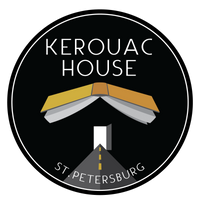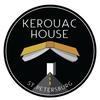I slept at Jack Kerouac’s home in St. Petersburg. You can, too.

ST. PETERSBURG — It’s a strange feeling to occupy someone else’s house when they aren’t around. Ken Burchenal might have sensed my hesitation as he showed me around the last home Jack Kerouac ever lived in.
“Feel free to snoop in the drawers,” said Burchenal, the Pinellas native and retired literature professor who bought the home with his wife, Gina, in 2020. “There really is nothing off limits.”
My trip to the concrete block ranch in the Disston Heights neighborhood was a bit mind blowing for several reasons. For one thing, the house is a mid-century time capsule of the writer’s final home base in St. Pete, right down to the wood paneled walls, terrazzo floors and fruit-patterned wallpaper. It felt like the Beat Generation poet could stumble around the corner at any moment.
Half of the retro furniture inside belonged to the Kerouac family, relics that give the place a museum vibe.
It’s all especially odd when you factor in the reason I was there: You can now schedule a slumber party at Kerouac’s old place.
In the last few months, the nonprofit behind the Kerouac residence has started booking daytime tours, evening stays and special events. You can cozy up with a copy of “On the Road” in Kerouac’s favorite writing chair, cook dinner in the same 1960s oven where his wife made cookies for the neighborhood kids or doze off in his old bed.
“There’s a lot of Kerouac DNA there,” Burchenal said.
To be clear, the Burchenals aren’t trying to turn this piece of literary history into an Airbnb. After purchasing the house, the couple joined forces with a pre-existing nonprofit, the Jack Kerouac House of St. Petersburg Inc., and started looking for new ways to raise funds for the group’s preservation mission. One strategy is to welcome folks into the three-bed, three-bath home. Burchenal has been accepting inquiries to stay overnight through the group’s website.
The cost: a tax-deductible donation of $250 a night, plus a $100 cleaning fee. Being a Kerouac fan is not a requirement.
“We don’t want this to be just an homage to Jack Kerouac,” Burchenal said. “We’re really interested in not only all of the Beats, but American counterculture.”
Then he handed me the keys to Kerouac’s house.

A home with history
The home at 5169 10th Ave. N was built in 1963. Kerouac and his mother moved in next door at 5155 10th Ave. N in the fall of 1964. They liked the quiet neighborhood, which was walking distance from stores and a library, wrote journalist Bob Kealing in his book, “Kerouac in Florida: Where the Road Ends.”
Plus, the rent was cheap then.
“Some people, they come in here and say, ‘Kerouac lived here? The king of the Beats?’” Burchenal said. “By the 1960s, he was sick of all that s--t. That’s one of the things he liked about it. It was under the radar.”
Kerouac quickly found some young drinking buddies to shoot pool with. Between lackluster book sales and the death of his sister, the year had been difficult. On Thanksgiving 1964, a drunken bender led to Kerouac’s arrest.
“The cops saw me piss in the street,” the writer said then, according to Kealing’s book. “First time in jail.”
The following year, Kerouac left St. Petersburg for Paris, where he burned through his “Desolation Angels” royalty check. He returned and wrote 30,000 words about the experience in one week, which became “Satori in Paris.” He also penned a few sports columns for the Evening Independent.
The family briefly moved back to Kerouac’s home state of Massachusetts in 1966, the same year Kerouac married his third wife, Stella. Kerouac, his mother and Stella returned to Disston Heights in 1968, according to Kealing’s book. That’s when they swapped houses with their neighbor, moving into what is now known as the St. Petersburg Kerouac house.
The home has two beds, a long velvet couch and a pull-out sofa, I learned during my initial walk-through with Burchenal. Enough space for a group of five writers, who may stay for a night of poetry readings, or a full-sized band, which may want to use the kitchen or backyard to record a live music session. Both scenarios are what the nonprofit’s board had in mind when it opened the home to interested donors. Solo travelers are also welcome.
 About half of the furniture inside Jack Kerouac's St. Petersburg home belonged to the writer and his family. The rest, including a record console, was added by the Burchenals after they purchased the house in 2020.
About half of the furniture inside Jack Kerouac's St. Petersburg home belonged to the writer and his family. The rest, including a record console, was added by the Burchenals after they purchased the house in 2020. The pleasure of the house lies in its details, like the Royal Standard typewriter Burchenal found to match the model Kerouac used. I was curious to know which items specifically overlapped with the author’s time here, and which had been added later to fill in the gaps.
No, Burchenal said. Yes. Maybe?
“The furniture is middle class, Ethan Allen kind of stuff, but nothing fancy,” he said. “If something looks nice, we probably bought it.”
The Kerouac family had been frugal, not flashy.
“When Kerouac died in ‘69, he had $200 in the bank,” Burchenal said. “That’s it. I mean, his star had fallen. And some of the last income he had probably went to buying the house.”

Earlier this spring, the throwback decor inspired a film crew to use the place as the set for a period piece.
“The director and producer walked in and said, ‘Well, we just saved about four or five grand in set design,’” Burchenal said.
Still, every other step took us to a new anachronism that reminded me where we were: A Kerouac bobblehead wiggled on a bookshelf. Souvenir rocks glasses sat for sale, $20 each, adorned with Kerouac’s face. Burchenal pointed out the Roku TV, the WiFi password.
“People come from all over,” he said. “They idolize Kerouac.”
Burchenal has seen it all: evidence of seances, half-drunk bottles of Scotch left behind, letters to Kerouac stuffed in the mailbox.
“Eventually, once we make some money, we want to create some kind of shrine out there… Just a visual experience for if you want to have your pilgrimage, you know, have it there. Don’t climb the fence,” he laughed.

In October 1969, Kerouac reached the end of his road here at age 47. It was not his finest year, observed the St. Petersburg Times reporter who came to visit him shortly before his death. Kerouac festered in a room illuminated by the flicker of a television set, chasing Scotch with beer.
On his last night, Burchenal noted as we reached the back of the house, Kerouac sat in his favorite writing chair by the window, then hobbled over to the pink toilet in the tiny bathroom across from where we stood. Then he went to St. Anthony’s Hospital and died. Complications from all the drinking did him in.
“Don’t worry about any of that,” Burchenal said. “What I say to folks is treat the things in here as if they were artifacts, because they are. But also, you can sit on the chair.”

A stay in the ‘spooky house’
Kerouac’s survivors stayed at the house until their deaths, too — his mother in 1973 and Stella in 1990.
Then, chaos ensued.
“Everybody sues everybody, and so the house is locked, like Tut’s tomb, until 2020,” Burchenal said.
After three decades of litigation finally wrapped up, the executor of estate at the time decided to sell the house to a flipping company for $220,000. Before it was turned over, the executor removed everything he deemed of value, including two filing cabinets crammed with unfinished works.
“Kerouac’s clothes were still hanging in the closet,” Burchenal said. “They sold a pair of jeans to Johnny Depp for five grand.”
Later in 2020, the company sold the home to the Burchenals for $360,000.
“Kerouac’s influence has only grown since the late ‘70s. And part of it is because he influenced so many artists that they kept his name alive,” Burchenal said. “I’ve had people walk in here and start crying.”
After he left, being inside the house alone felt kind of eerie.
Several factors contributed, starting with the humming that spilled from the closet in the writing room. The dozen or so paintings and pictures of Kerouac throughout the home did not help. Too many eyes!
Above all, Burchenal planted a seed when he told me his housekeeper had a nickname for the property: “the spooky house.”
St. Pete residents like to say Kerouac’s ghost haunts nearby bookstore Haslam’s, but the shop has been closed since the pandemic started. What if his spirit got bored and came back here? To be safe, I offered a little greeting.
“Hi!” I called out, feeling silly. “My name is Gabrielle. I’m a writer. It’s an honor to be here.”

You could head to Al Lang Stadium (formerly Al Lang Field), where he spent his final birthday enjoying a baseball game. You could grab a nightcap at the Flamingo, which has made a name for itself as a Kerouac-approved watering hole with a $2.50 whiskey and beer “Kerouac Special.” If the timing is right, you could check out a poetry reading, art show, film screening or bike tour offered by the Friends of Jack Kerouac.
In the end, my party bone wasn’t as pronounced as Kerouac’s had been, at least not on a Monday night. We whipped up a Trader Joe’s salad kit and Impossible chicken nuggets in the vintage kitchen, danced to jazz records in the living room, then crawled into Kerouac’s old bed to watch a video of him reciting some poetry. Burchenal had warned us it wasn’t the most comfy mattress, and he was right. After the video concluded, we relocated to the next room over — Kerouac’s former writing nook — and fell asleep next to the typewriter.

In the end, I decided to do what Kerouac, even in his final years, would have done.
I curled up in his old armchair and started to write.
How to visit the Jack Kerouac House of St. Petersburg
Jack Kerouac’s former house, now run by volunteers, is at 5169 10th Ave. N, St. Petersburg. To schedule a tour, host an event or inquire about an overnight stay, contact the Jack Kerouac House of St. Petersburg Inc. through the organization’s website, stpetekerouachouse.com.
Private visits are arranged on a case-by-case basis, Burchenal said. Private tours for one to four people can be arranged in exchange for a minimum donation of $100. Overnight stays for up to five people can be booked for $250 a night and a $100 cleaning fee, though discounts are possible for extended stays. Follow facebook.com/KerouacHouseStPeteand @kerouachouse on Instagram for updates.
The next event at the house is a birthday party for Allen Ginsberg from 7 to 10 p.m. June 3, featuring live music, food, poetry readings and the screening of a Ginsberg documentary. Tickets cost a minimum donation of $20 and must be purchased in advance through Eventbrite.


